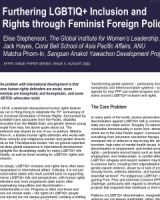Research

GIWL is a multi-disciplinary research institute that brings together world-leading expertise across academic disciplines and fields in the areas of workplace gender equality and women's leadership. Our research is driven by three key priorities:
1.Identifying the things that facilitate systemic change in workplace gender equality and women’s representation in leadership
2.Understanding the intersectional nature of workplace gender discrimination
3.Developing and testing evidence based solutions to increase women’s representation in leadership roles
A complete list of GIWL ANU publications can be found in the list below, or you can explore some of our recent projects by theme:
GIWL ANU has also established a network of Research Affiliates. Our affiliates make up a global network of accomplished research partners working towards the common goal of improving workplace gender equality and women’s leadership. You can find out more about the network and the cutting edge research being undertaken in women’s leadership and workplace gender equality here.
If you are interested in partnering with GIWL at ANU on research or other ways to accelerate change, we would love to hear from you. Please contact us.
Publications
Understanding the care economy in Southeast Asia
Author/editor: Dr Elise Stephenson, Prof Michelle Ryan, Dr Morgan Weaving & Dr Betty Barkha
Year published: 2023
What does the care economy look like in Southeast Asia? When it comes to looking after children, the elderly and disabled communities, who is doing the work and how is this labour valued, perceived and compensated? To answer these questions, we undertook a comprehensive overview of the care economy...
Changing the culture - Codes of conduct for the Commonwealth Parliament
Author/editor: Barr, N., Maley, M., Sawer, M., Baker, K., and Ryan, M.K.
Year published: 2022
Submission by the Global Institute for Women's Leadership to the Joint Select Committee on Parliamentary Standards inquiry into the development of codes of conduct for Commonwealth Parliamentary Workplaces and related matters. 2021 was a turning point for Australia’s parliamentary workplaces...
Changing the culture - Codes of conduct for the Commonwealth Parliament
Author/editor: Barr, N., Maley, M., Sawer, M., Baker, K., and Ryan, M.K.
Year published: 2022
Submission by the Global Institute for Women's Leadership to the Joint Select Committee on Parliamentary Standards inquiry into the development of codes of conduct for Commonwealth Parliamentary Workplaces and related matters. 2021 was a turning point for Australia’s parliamentary workplaces...
Election 22 - Glass cliff candidates
Author/editor: Summerhayes, E. and Ryan, M.
Year published: 2022
Research policy brief - Women candidates running in unwinnable seats in the 2022 federal election As major political parties make up the vast majority of MPs in the House of Representatives, increasing the number of female candidates they put forward at each election is important in ensuring our...
Furthering LGBTIQ+ Inclusion and Rights through Feminist Foreign Policy
Author/editor: Stephenson, E., Hayes, J.and Phorn-In, M.
Year published: 2022
The problem with international development is that some human rights defenders are sexist, some feminists are transphobic and homophobic, and some LGBTIQ+ advocates racist.
GIWL Submission to the Senate Select Committee on Work and Care
Author/editor: Glennie, M, Mikolajczak, G, Fisher, A
Year published: 2022
We welcome the establishment of a Senate Select Committee to address the important issues at the intersection of work and care. Although there are many forms of care that impact the work and non-work wellbeing of carers, in our submission we focus on providing a gender lens to issues relevant to...
Intersectional Invisibility in Women’s Diversity Interventions
Author/editor: Chuck Yan E Wong, Teri A Kirby, Floor Rink and Michelle K Ryan
Year published: 2022
Many diversity interventions for women are ineffective. One reason for this may be that the field that diversity interventions are usually based on, the social sciences, often do not consider intra-group differences among women. Specifically, differences by racialization may be excluded from such...
Overestimating women’s representation in medicine: a survey of medical professionals’ estimates and their (un)willingness to support gender equality initiatives
Author/editor: Begeny, C., Grossman, R., Ryan, M.
Year published: 2022
ABSTRACT Objective Amidst growing numbers of women in certain areas of medicine (eg, general practice/primary care), yet their continued under-representation in others (eg, surgical specialties), this study examines (1) whether medical professionals mistakenly infer that women are now broadly well...
Strengthening Female Entrepreneurship in Vietnam
Author/editor: Carter, J
Year published: 2022
Developing the right conditions for women-led businesses to prosper and generate real-world effects is of remarkable importance for future economic growth and development in Vietnam. Women-owned enterprises (WOEs) in Vietnam not only stimulate income and employment, but they are also the pioneering...
Supporting men or male privilege? Women's progressive and reactionary collective action for men
Author/editor: Mikołajczak, G, Becker, J
Year published: 2022
In a new journal article, GIWL Research Fellow, Dr Gosia Mikołajczak, and Dr Julia Becker look at how women’s engagement in collective action for men can increase gender equality or reinforce male privilege. Collective action for other groups, such as men supporting the #MeToo movement or Whites...


























